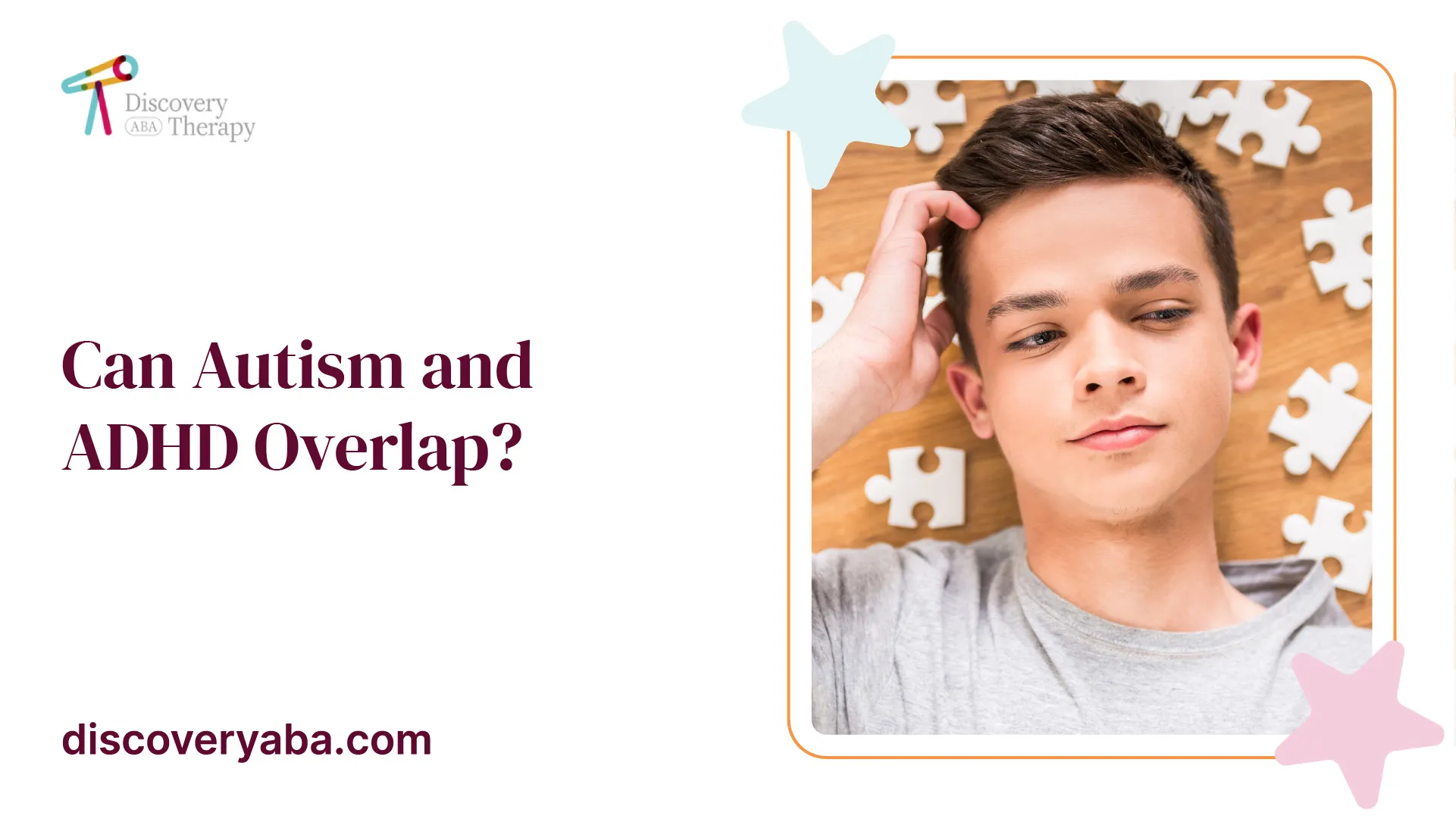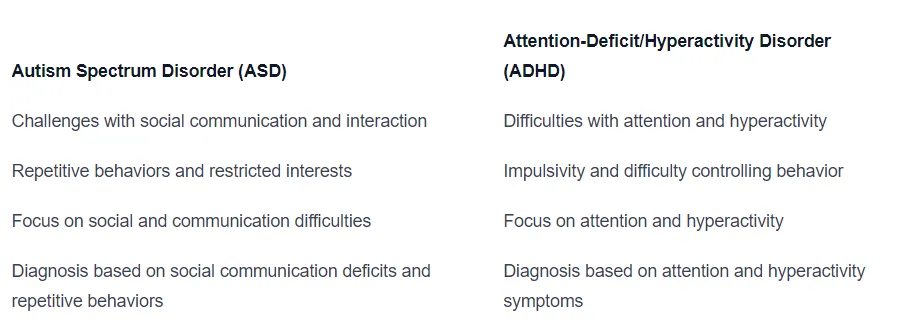Can Autism and ADHD Overlap?
The Blurred Lines between Autism and ADHD. Discover the Similarities, Differences, and the Risk of Misdiagnosis.

Understanding Autism and ADHD
To explore the potential overlap between autism and ADHD, it is important to have a clear understanding of these two conditions. This section provides an overview of autism spectrum disorder (ASD), attention-deficit/hyperactivity disorder (ADHD), and highlights the key similarities and differences between them.
Overview of Autism Spectrum Disorder (ASD)
Autism spectrum disorder (ASD) is a neurodevelopmental disorder that affects social interaction, communication, and behavior. Individuals with ASD may exhibit a wide range of symptoms, which can vary in severity. Some common characteristics of ASD include challenges with social communication, difficulty forming and maintaining relationships, repetitive behaviors, and restricted interests.
ASD is typically diagnosed in early childhood, although some cases may go undiagnosed until later in life. It is estimated that 30% to 50% of individuals with autism also have ADHD, which can complicate the diagnostic process.

Overview of Attention-Deficit/Hyperactivity Disorder (ADHD)
Attention-deficit/hyperactivity disorder (ADHD) is a neurodevelopmental disorder characterized by difficulties with attention, hyperactivity, and impulsivity. Individuals with ADHD may struggle with maintaining focus, completing tasks, and controlling impulsive behaviors. ADHD is typically diagnosed in childhood, although it can persist into adolescence and adulthood.
Key Similarities and Differences
While there are overlapping symptoms between autism and ADHD, it is important to understand the key differences that distinguish these two conditions.

Understanding these differences can help healthcare professionals in accurately diagnosing individuals who may exhibit symptoms of both conditions. It is crucial to undergo a comprehensive evaluation by a healthcare professional to receive an accurate diagnosis and appropriate treatment plan.
In the following sections, we will explore the potential for autism to be mistaken for ADHD, the challenges in differentiating between the two conditions, and the importance of an accurate diagnosis for tailored interventions and support.
Can Autism be Mistaken for ADHD?
When it comes to neurodevelopmental disorders, there can often be overlap and confusion between different conditions. Autism Spectrum Disorder (ASD) and Attention-Deficit/Hyperactivity Disorder (ADHD) are two such conditions that share certain characteristics, leading to the question of whether autism can be mistaken for ADHD. Let's explore this further.
Delayed Autism Diagnosis in Children with ADHD
Research suggests that children and adolescents initially diagnosed with ADHD may receive an ASD diagnosis later than those without a prior ADHD diagnosis. On average, children with pre-existing ADHD receive an autism diagnosis approximately 1.8 years later compared to children with ASD only. The delay in diagnosis is more pronounced in girls compared to boys, with a delay of 2.6 years in girls and 1.5 years in boys.
Overlapping Symptoms and Misdiagnosis
The overlapping symptoms between autism and ADHD can contribute to misdiagnosis. Approximately half of the children with a late ASD diagnosis had previously been diagnosed with another neurodevelopmental disorder, including ADHD, or had exhibited ADHD symptoms during initial assessments. This suggests that ADHD symptoms may mask emerging features of ASD, leading to misdiagnosis or delayed diagnosis.
Autism Severity and Misdiagnosis
Autism severity may also play a role in the relationship between prior ADHD diagnosis and the age of ASD diagnosis. Children with a prior ADHD diagnosis and lower autism severity may receive an ASD diagnosis later compared to those with higher autism severity. The severity of autism symptoms can complicate the identification of ASD, potentially leading to misdiagnosis or delayed diagnosis.
It's important to note that the relationship between autism and ADHD can vary across different age groups. In the adult sample studied, there was no significant difference in the timing of ASD diagnosis between individuals with a prior ADHD diagnosis and those without.
Understanding the potential for mistaken diagnoses between autism and ADHD highlights the need for comprehensive assessments and evaluations by healthcare professionals. Accurate diagnosis is crucial to ensure appropriate interventions, support, and tailored treatment plans for individuals with neurodevelopmental disorders. By sharing detailed behavioral observations and developmental history, along with collaborative diagnosis and treatment planning, healthcare professionals can work towards providing the most accurate and effective support for individuals with autism and ADHD.
Differentiating between Autism and ADHD
Distinguishing between autism and ADHD can be challenging due to overlapping symptoms. However, a proper evaluation by a healthcare professional is crucial to receive an accurate diagnosis. Understanding the unique characteristics of each condition can help differentiate between autism and ADHD.
Diagnostic Challenges and Evaluation Process
Diagnosing autism and ADHD requires a comprehensive assessment that includes the evaluation of social, communication, and behavioral symptoms. Clinicians consider various factors, such as medical history, developmental milestones, and observed behaviors. The evaluation process may involve interviews, questionnaires, and direct observations.
Unique Characteristics of Autism
Autism Spectrum Disorder (ASD) is associated with challenges in social communication and interaction, repetitive behaviors, and restricted interests. Individuals on the autism spectrum may struggle with social cues and have difficulties in understanding and reciprocating social interactions. They often exhibit rigid adherence to routines and can become emotionally stressed by unexpected changes. Specialized interests are common, and individuals with autism tend to maintain a focused interest for extended periods.
Unique Characteristics of ADHD
Attention-Deficit/Hyperactivity Disorder (ADHD) is typically characterized by difficulties with impulse control, hyperactivity, and inattention. Individuals with ADHD may have trouble staying focused, organizing tasks, and maintaining attention. They often display impulsive behavior and have difficulty with self-regulation. Unlike autism, individuals with ADHD may have disinterest in routines and struggle to maintain them. While both autism and ADHD can involve specialized interests, individuals with ADHD tend to drop tedious tasks quickly compared to the strict adherence seen in those on the autism spectrum.
By recognizing the unique characteristics of autism and ADHD, healthcare professionals can differentiate between the two conditions. Accurate diagnosis is crucial for providing appropriate care and interventions tailored to each individual's needs. It is essential to understand that while autism and ADHD share some commonalities, they are distinct neurodevelopmental conditions that require specialized approaches to support individuals effectively.
Importance of Accurate Diagnosis
Accurate diagnosis of autism and ADHD is crucial for understanding and addressing the unique needs of individuals. Misdiagnosis or delayed diagnosis can have significant implications for individuals, their families, and their overall quality of life. Let's explore the importance of accurate diagnosis, the potential implications of misdiagnosis, and the need for tailored interventions and support.
Implications of Misdiagnosis
Misdiagnosis occurs when autism is mistaken for ADHD or vice versa. This can lead to several consequences, including delayed access to appropriate interventions and support. According to a study published by the National Center for Biotechnology Information (NCBI), children and adolescents initially diagnosed with ADHD received an average autism diagnosis delay of 1.8 years compared to those with an ASD-only diagnosis. In boys, the delay was around 1.5 years, while in girls, it was approximately 2.6 years in the presence of pre-existing ADHD. It's important to note that caution should be exercised when interpreting findings in the adult sample.
Tailored Interventions and Support
Accurate diagnosis allows for tailored interventions and support that address the specific challenges individuals face. While ADHD and autism share some overlapping symptoms, they also have distinct characteristics and require different approaches. A misdiagnosis can result in individuals receiving interventions that may not effectively target their specific needs.
Tailored interventions for ADHD often focus on improving attention, impulse control, and executive functioning skills. On the other hand, individuals with autism may benefit from interventions that target social communication, sensory sensitivities, and repetitive behaviors. By accurately identifying whether an individual has ADHD or autism, professionals can design interventions that align with their unique strengths and challenges.
Long-Term Outcomes and Quality of Life
Proper diagnosis and appropriate interventions at an early stage can significantly impact long-term outcomes and overall quality of life. Delayed or misdiagnosed cases can result in missed opportunities for early interventions and support, potentially leading to difficulties in academic, social, and emotional domains.
Early diagnosis and intervention have been shown to improve outcomes for individuals with autism and ADHD. With timely support, individuals can develop coping strategies, acquire necessary skills, and access resources that enhance their overall well-being and long-term success. Accurate diagnosis plays a vital role in providing the appropriate support that can positively impact an individual's life trajectory.
Accurate diagnosis and timely interventions are paramount for individuals with autism and ADHD. It is essential to seek professional evaluation, share behavioral observations and developmental history, and collaborate with healthcare professionals to ensure accurate diagnosis and access to tailored interventions. By doing so, individuals can receive the support they need to thrive and lead fulfilling lives.
Seeking Professional Evaluation
When faced with the possibility of autism or ADHD, seeking a professional evaluation is crucial for obtaining an accurate diagnosis. Healthcare professionals, including developmental pediatricians, child psychologists, and psychiatrists, play a vital role in conducting comprehensive assessments to differentiate between the two conditions. In this section, we will explore the steps involved in seeking professional evaluation for autism and ADHD.
Comprehensive Assessments by Healthcare Professionals
To differentiate between autism and ADHD, a comprehensive evaluation by healthcare professionals is necessary. This evaluation may involve a multidisciplinary team of experts who specialize in neurodevelopmental disorders. Developmental pediatricians, child psychologists, and psychiatrists are among the professionals who can conduct thorough assessments.
During the evaluation process, the healthcare professionals will consider various factors, including the individual's developmental history, behavior patterns, social interactions, communication skills, and sensory sensitivities. This holistic approach allows them to identify the core characteristics of each condition and make an accurate diagnosis.
Sharing Behavioral Observations and Developmental History
When seeking a professional evaluation, it is essential to share detailed behavioral observations and developmental history of the individual being assessed. This information can provide valuable insights into the individual's symptoms, challenges, and strengths. Family members, caregivers, and teachers can contribute by providing their observations and experiences in different settings, such as home, school, and social environments.
By sharing this information, healthcare professionals gain a comprehensive understanding of the individual's neurodevelopmental profile. This input helps them differentiate between autism and ADHD accurately and tailor interventions accordingly.
Collaborative Diagnosis and Treatment Planning
A collaborative approach between healthcare professionals, individuals, and their families is crucial for an accurate diagnosis and effective treatment planning. By working together, the healthcare professionals can gain a more comprehensive understanding of the individual's needs and tailor interventions accordingly.
Once the evaluation is complete and a diagnosis has been made, healthcare professionals can guide individuals and their families in developing a treatment plan. This plan may include various interventions, such as behavioral therapies, educational support, medication management (if necessary), and individualized strategies to address specific challenges associated with autism or ADHD.
By seeking professional evaluation, individuals can obtain an accurate diagnosis, which is the foundation for accessing appropriate interventions and support. A thorough assessment by experienced healthcare professionals ensures that individuals receive the necessary guidance and resources to enhance their long-term outcomes and improve their quality of life.
References
- https://emergeprofessionals.com/can-autism-be-misdiagnosed-as-adhd/
- https://www.getinflow.io/post/adhd-vs-autism-asd-similarities-and-differences
- https://www.medicalnewstoday.com/articles/325618https://www.healthline.com/health/adhd/autism-and-adhd
- https://neurodivergentinsights.com/misdiagnosis-monday/adhd-vs-autism
- https://chadd.org/attention-article/understanding-and-differentiating-between-autism-and-adhd/
Does Your Child Have An Autism Diagnosis?
Learn More About How ABA Therapy Can Help
Find More Articles
Contact us
North Carolina, Nevada, Utah, Virginia
New Hampshire, Maine
Arizona, Colorado, Georgia, New Mexico, Oklahoma, Texas
.avif)




































































































